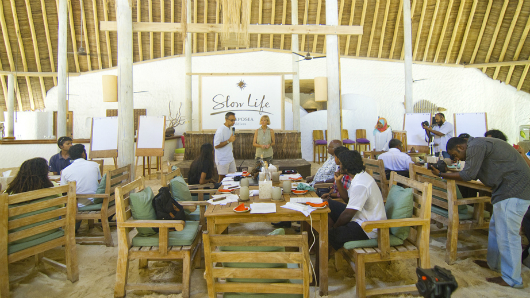Environmental organisations, state agencies, and marine enthusiasts gathered in the Vilimalé beach this weekend for a unique environment festival aimed at educating and informing the public about conserving coral reef ecosystems.
The ‘1 National Coral Revival’ festival – the first of its kind – was organised by Vilimalé-based NGO Save the Beach as part of an awareness campaign about its reef rehabilitation and monitoring programme.
Amid a backdrop of live music by local artists, the event featured coral planting, information sessions and talks at an “awareness tent,” food stalls, diving lessons, free water sports, and guided snorkelling.
The festival was planned to coincide with World Environment Day on Friday, but kicked off a day late due to stormy weather. Environment minister Thoriq Ibrahim and tourism minister Ahmed Adeeb attended the opening ceremony on Saturday.
Students, teachers, and parents with their children visited the festival and participated in interactive activities.
The UNDP offered a “nature walk” while the Maldives Whale Shark Research Programme gave presentations about the largest fish in the sea. NGOs such as the Olive Ridley Project, marine consultancy company Seamarc, and marine biologists from several resorts shared information about environmental initiatives.
Fathmath Thanzeela from Save the Beach said participatory activities such as coral planting were intended to give “a sense of ownership” and encourage engagement.
“What we hoped to achieve is a demonstration project so that we can share knowledge and build capacity of other NGOs,” she said.
A core message from the festival is the importance and vulnerability of the reef ecosystem in Vilimalé.
A coral reef is “very delicate and takes thousands of years to grow,” Thanzeela said, and coral planting is not a viable solution for rebuilding a devastated reef.
Coral planting is intended to “beautify and boost biodiversity,” she said.
Save the Beach started a coral nursery in Vilimalé last year with coral colonies rescued from a reclamation site in Hulhumalé.

As Malé does not have a natural beach, Thanzeela noted that the Vilimalé beach is used by the one-third of the Maldivian population that resides in the capital.
“We owe it to the next generation to preserve this beach,” she said.
Thanzeela said the public response to the festival was positive and expressed gratitude to business partners who “wholeheartedly contributed to the cause”.
“There were about 70 people ‘try diving,’ close to 200 people who planted corals in the shallow, and lots of people did water sports,” she said.
The public support suggested that “people’s minds are opening up,” she said, and a conservation ethic would follow when “people become friendlier with the sea.”
Coco Island resort marine biologist, Nathaniel Stephenson, said the festival brought together “organisations with the same moral core conservation ethic” in one place to network and share ideas.
“But most importantly, to educate the local people, the local community, and I think it’s really done that well, mixing music with awareness, making it fun and accessible as well,” he said.

The festival
The Project Damage Control stall challenged visitors to sort garbage under general waste, organic trash, paper, or recyclables.
Visitors were also asked to guess the time it takes for plastic bottles, glass, and aluminium cans to decay.
“We want to spread awareness through a challenge. When you throw out trash, there are recyclable items and there are separate bins for that,” said Ihusan Abdul Muhsin.
Most visitors guessed right but stumbled on the biodegradation timelines, expressing surprise with the one million years it takes for glass to decompose.
The message: “When you throw a plastic bottle to the sea, it takes 450 years to degrade and it destroys corals,” said Ihusan.
In its stall, Manta Trust, a UK-based charity, showcased its work in identifying manta rays with photos of the unique pattern of spots on its underside.
Ibrahim Lirar said Marine Trust has more a catalogue of than 3,000 “photo IDs” of individual manta rays.
“We need more events like this, more platforms, so we can talk about the conservation of our environment. The current situation is very dire. The skipjack tuna catch is dropping. 2007 was the peak. We’re now catching the same number of tuna we caught in 1999 with today’s technology and fishing power,” Lirar said.
Dr Shamha Abdulla Hameed, dean of the faculty of marine studies at Villa College, suggested that the festival should be held at least once a year.
“You get to do a lot of networking. And everybody sees that there are a lot of people involved in this area of work,” she said.
Some parents are unaware of the job opportunities for marine science graduates, she observed, noting that most resorts have dive masters, water sports assistants, and a marine conservation centre with interns earning US$400 a month.
The UNDP meanwhile offered a nature walk with a guide explaining the environmental benefits of than 40 species of plants in Vilimalé. Some trees act as wind barriers and help to prevent coastal erosion.
“Usually we just give information in stalls about projects, which is not very interactive. So we came up with something that might involve them and make them passionate about the environment,” said Abdulla Adam, who took visitors on a tour across the island.
Mohamed Shimal from the Marine Research Centre said its stall emphasised the economic value of coral reefs to the Maldives – which are essential for the sustainability of the fisheries and tourism industries – and explained the damage that humans could cause to the fragile ecosystems.
The centre offered drawings of fish and corals to children for colouring with environmental messages on the back.
“For example, don’t harm corals when you swim because it grows very slowly. And don’t throw plastic bags in the sea because it suffocates corals and turtles also die after eating it,” Shimal said.


